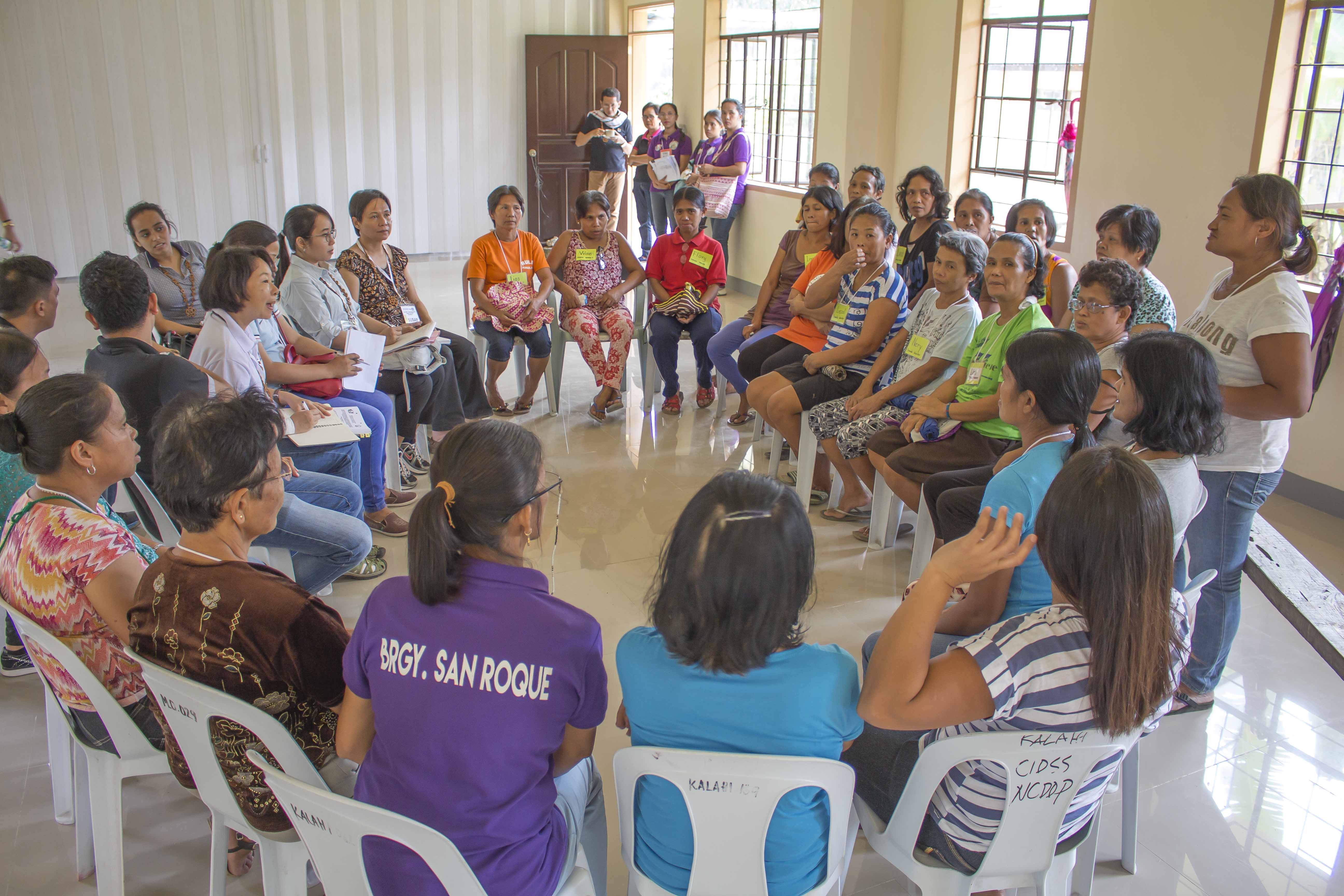|
|
Four villages in Sorsogon were visited by the team of DSWD’s development partner to review the environment and social safeguards aspect of the Kapit-Bisig Laban sa Kahirapan-Comprehensive and Integrated Delivery of Social Services (Kalahi-CIDSS) during the two-day monitoring visit last August 18-19, 2016.
The team of Asian Development Bank (ADB), one of the development partners of Kalahi-CIDSS, checked on the status of community-proposed sub-projects in Donsol and Bulusan to ensure that policies on environmental and social safeguards assessment are met and all subprojects undertaken by the community are environmentally and socially sound and sustainable. These community sub-projects must have minimal environmental and social impacts through the enforcement of the Environmental and Social Management Framework (ESMF).
The completed three-classroom school building in Brgy. Tres Marias amounting to PhP2,633,684 and the ongoing construction of flood mitigation in Brgy. Gimagaan with a total cost of PhP2,007,646 were visited in Donsol last August 18.
Brgy. Dapdap and Brgy. San Raque were also monitored in Bulusan the next day with the ongoing construction of seawall with a cost of Php3,324,355 and completed evacuation center 4,495,000, respectively.
The ADB team is headed by Joel Mangahas, the Mission Leader/Senior Social Sector Specialist with Social Development Specialist Yukiko Ito, Technical Assistance Coordinator/Consultant Rowena Mantaring, Procurement Specialist Alice Tiongson, Capacity Development Consultant Romulo Romero and Community Infrastructure Specialist Roger Calfoforo.
The ADB team was also joined by the DSWD Project Management Team for Kalahi-CIDSS headed by Cicero Aguilar from the National Office and Irene Malong from the Regional Project Management Office who exchanged dialogues with the LGU officials and the community residents.
In the community, they had community consultations with the barangay officials and the Barangay Sub-Project Management Committee (BSPMC), the overall management committee formed for the Kalahi-CIDSS implementation. They were divided in three groups where they separately discussed social safeguards for the first group, gender mainstreaming for the second and financial management, procurement and infrastructure for the third.
“We hope to address the issues and findings raised during our visit with the inputs from the community to improve the implementation,” Mangahas said.
Ito noted that 18% of women are participating in paid labor and must increase this 20 to 30 percent before the compact with ADB ends in 2017. Morales also emphasized that the community must ensure proper document filing system for easy audit and should train women in welding, plumbing and other non-traditional jobs to provide employment opportunity for women even outside Kalahi-CIDSS construction engagement. Mantaring said that the Environmental and Social Management Plan (ESMP) form will be simplified and the project staff should emphasize the use of this form to the communities. Calfoforo commended DSWD Region V for the excellent implementation of Kalahi-CIDSS.
Moreover, the field visit aims to look more deeply into the implementation of Kalahi-CIDSS Yolanda-affected communities in accordance with the ADB requirements, particularly social safeguards and gender mainstreaming. It will review the (i) compliance of subprojects with the ADB’s Safeguards Policy Statement and any outstanding safeguards issues from previous mission, and propose measures to resolve these; (ii) implementation status of the gender action plan, and identify any potential constraints and facilitating factors to achieving the ongoing actions and targets; (iii) financial management and procurement particularly at the community level; (iv) technical aspects of subprojects; and (v) capacity building in line with ongoing efforts to establish continuing professional development program for KC-NCDDP staff and related interventions. The field visit will follow up the EA on the agreements during the midterm review mission. The findings and agreements will be summarized and incorporated in the memorandum of understanding (MOU) that will be prepared for the joint ADB-World Bank mission in October 2016.
On 13 December 2013, the Asian Development Bank (ADB) approved L3100-PHI: an emergency assistance loan to the Government of the Philippines to support the implementation of the government’s Kalahi-CIDSS by restoring basic social services and rebuilding communities affected by typhoon Yolanda. The project became effective on 10 June 2014. Kalahi-CIDSS has an estimated cost of $1.132 billion, of which the government finances $270 million (24%), while ADB and the World Bank (WB) provide $372.1 million (33%) and $479.0 million (42%), respectively, and the Government of Australia provides a grant of $11.0 million (1%). The Department of Social Welfare and Development is the executing agency (EA) of Kalahi-CIDSS.
Kalahi-CIDSS Expansion
Kalahi-CIDSS is supported by the Philippine Development Plan (2011-2016). Its expansion using the CDD approach in the country was approved last 18 January 2013. 101 poor municipalities in Bicol are under its expansion from 2014 to 2019 with a total of grant of Php4,497,448,178.
The development objective of Kalahi-CIDSS is to have barangays/communities of targeted municipalities become empowered to achieve improved access to services and to participate in more inclusive local planning, budgeting, and implementation.
“It will also be aligned into a program to support community-driven post-disaster response and development in Typhoon Yolanda-affected municipalities within provinces covered by Kalahi-CIDSS,” DSWD Dir. Arnel Garcia added.
Moreover, Bicol received a total of Php2,199,377,794.46 from ADB to implement Kalahi-CIDSS in 60 municipalities from 2014 to 2017.
L3100-PHI: KALAHI-CIDSS National Community-Driven Development Project
Terms of Reference for the ADB Field Visit
17-20 August 2016, Sorsogon
L3100-PHI: KALAHI-CIDSS National Community-Driven Development Project
Terms of Reference for the ADB Field Visit
17-20 August 2016, Sorsogon

